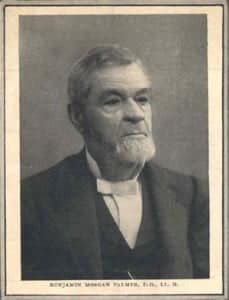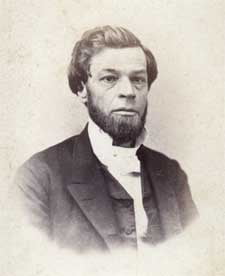—The decease of Dr. Palmer of New Orleans is like a change in the landscape of the South. As far as it is possible for one man in the space of a lifetime to grow to be a part of the fixed order of things, Dr. Palmer had become identified like some old-time landmark with his denomination, his city and his section of the nation. he was one of that class of men who are incapable of change; what he was as he came to the maturity of manhood he remained until death. It is doubtless true that the world would be unfortunate if all its strong men should crystallize in that adamantine way, but living in a time that suffers little lack of impulses to progress, we ought to thank God that He still scatters through the churches some immovable men to hinder and obstruct headlong haste.
From an almost opposite pole of Christian temperament THE INTERIOR clearly recognizes that Dr. Palmer served God and his generation as a symbol of the immutability of the great essentials of our religion. His faithful witness to Jesus Christ in the word of his preaching and the example of his ministry gave him such power in New Orleans as few of the Lord’s ambassadors have ever wielded in any age of the church. By all consent he was acknowledged for years to be the most influential man in that city, and he was so brave and outspoken that he made for righteousness not only in the private lives of men but in the civic life of the community. He was born in Charleston, S.C. on January 25, 1818 and had been over leading churches in Savannah and Columbia before he went to the First Presbyterian church of New Orleans in 1856. His pastoral term there covered fifty-six consecutive years.
He retained excellent vigor and still preached powerfully despite his great age, and his life might have been prolonged still for several years if he had not suffered injury beneath a street car which ran him down in the streets of New Orleans a few weeks ago. He did not die from the direct effects of that accident, but the shock seemed so to weaken his vital powers that fatal disease soon supervened.
[excerpted from THE INTERIOR, Vol. 33, No. 1671 (5 June 1902): 734.]
 As an example of Dr. Palmer’s influence, not just within the Church, but in the civic life of New Orleans, here is a portion of an account of his opposition to the lottery there.
As an example of Dr. Palmer’s influence, not just within the Church, but in the civic life of New Orleans, here is a portion of an account of his opposition to the lottery there.
In the fall of 1891 a great meeting was held in New Orleans in order to stir up the heart of the people and warn them to use all efforts to arrest the spirit of public gambling. Some fine addresses were delivered, but Dr. Palmer of the Synod of Mississippi delivered the crowning address. His whole heart was aflame with the subject and the sympathy of the big congregation was with him. His address struck the right chord at the right time and it broke the backbone of the lottery. It was a great address and for the purpose of embalming it in the memory of our young people, we are giving it word for word as delivered that night. We leave out the cheers and the plaudits and the hand-clapping which were in evidence all through the speech.
Mr. Chairman and fellow citizens of Louisiana.
“I lay the indictment against the Lottery Company of Louisiana, that it is essentially an immoral institution whose business and avowed aim it is to propagate gambling throughout the state and throughout the country. This being not simply a nuisance but even a crime, no Legislature as the creature of the people nor even the people themselves in convention assembled, have the power to legitimate it either by legislative enactment upon the one hand or by fundamental charter upon the other. In other words, I lay the indictment against the Louisiana Lottery Company that its continued existence is incompatible not only with the safety but with the being of the state.
In saying this, sir, I desire to be understood as not simply uttering the language of denunciation. I frame the indictment and I propose to support each of its specifications by adequate proof; and I do this the more distinctly from the conviction that there are many citizens throughout our bounds, who, having been accustomed to look at the lottery simply as a means of revenue either public or private, have not sufficiently considered the inherent viciousness of this system itself.
And it is that class which I hope this night to reach and to range upon our side in this great controversy.
Indeed, sir, if the worst should come to the worst in this present campaign, I for one could wish that, all technicalities being swept away, there might be some method by which the question might be carried up to the Supreme Court of the United States whether it is competent to any state in the union to commit suicide. And if that venerable court should return an answer, which I think they would not for a moment consider as possible, I would then for my part make the appeal to the virtues and common sense of the masses of our people, that the very instinct of self-preservation may stamp out of existence an institution which is fatal to the liberties and the life of the commonwealth. . .
To read the rest of Palmer’s message, click here.
Words to Live By:
Pastors, and Christians in general, can and ought to have a voice as citizens, and our voice should and must be informed by the Scriptures. PCA pastor Mike Milton has a new book forthcoming titled Silent No More, which speaks to this issue, and which should be well worth reading.
Image sources:
1. Carte de vis photograph from a collection gathered by Thomas Dwight Witherspoon. The original was lost in a fire, but had been thankfully scanned prior to that loss.
2. Cover photograph from THE INTERIOR, Vol. 33, no. 1671 (5 June 1902).
All scans prepared by the staff of the PCA Historical Center.

